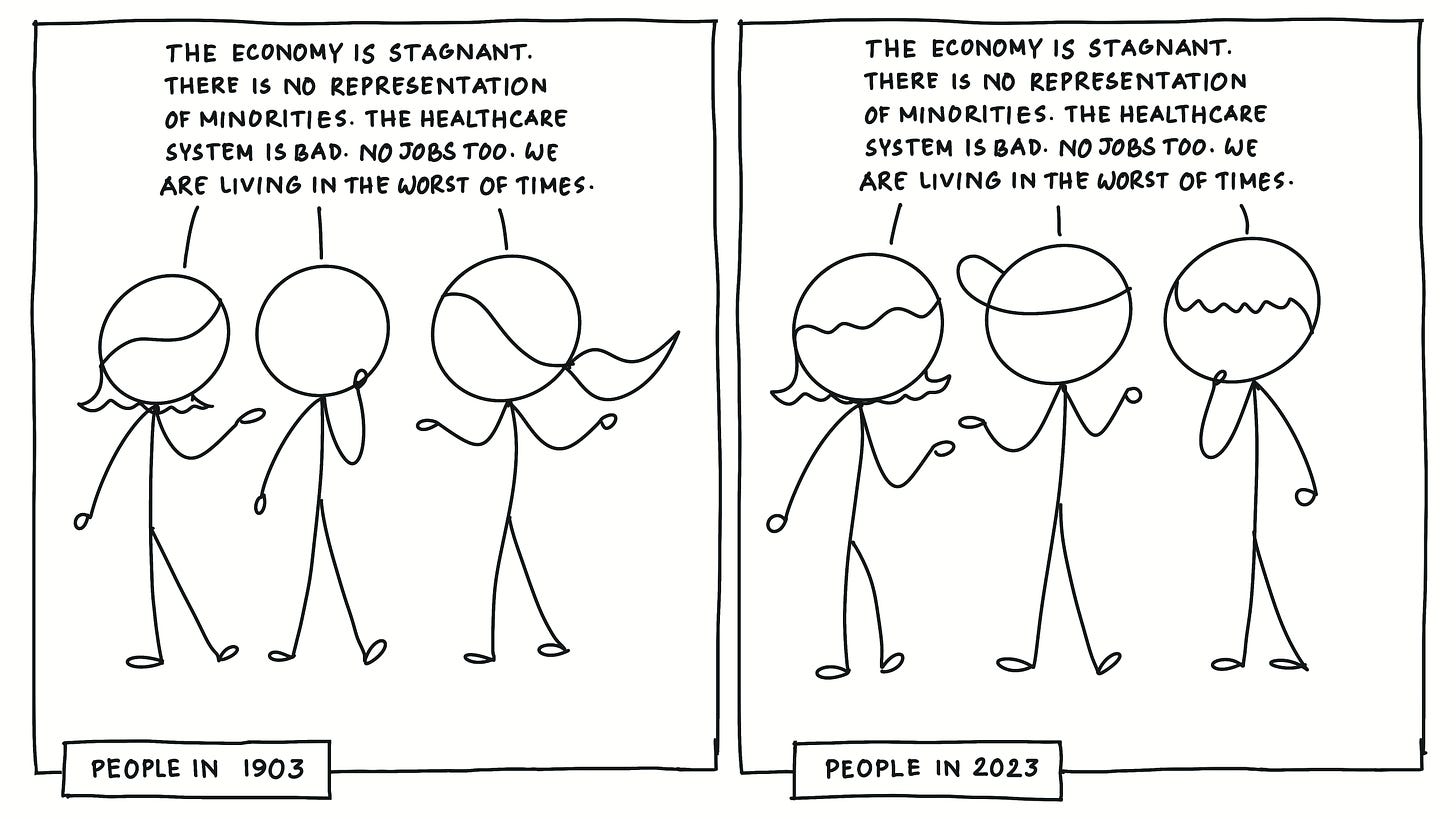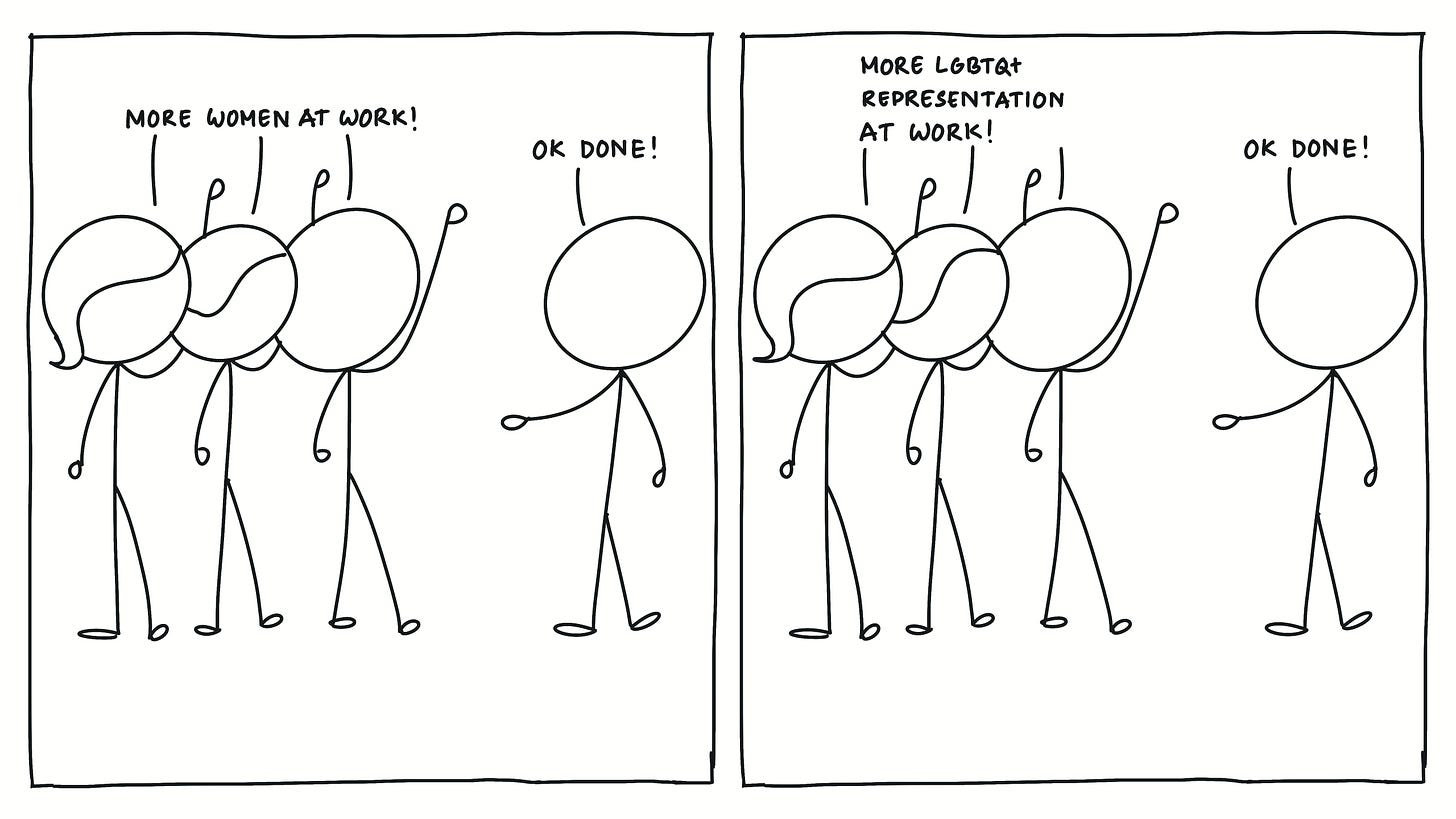👋 Hey there! My name is Abhishek. Welcome to a new edition of The Sunday Wisdom! This is the best way to learn new things with the least amount of effort.
It’s a collection of weekly explorations and inquiries into many curiosities, such as business, human nature, society, and life’s big questions. My primary goal is to give you some new perspective to think about things.
If you like this essay, could you do me a favour and hit that 🤍 heart so that it becomes a ♥️ heart? This helps me understand what kind of topics I should write more about. This also signals Substack that more people should read this essay.
Q: When asked, why do most people feel like things are only getting badder and badder with time?
Take this scenario (that you might have experienced in real life): You are standing in line for airport security and you notice an agent tear apart a carry-on, mistakenly thinking someone’s innocent banana is a concealed firearm; or a wheelchair-bound-90-yo get a full-body pat-down because her mischievous 6-yo grandkid stashed a pair of scissors in her purse.
Now, here’s a question for you: all of a sudden if people stopped bringing disallowed stuff to the airport and the luggage scanners stopped going off, would the airport security just relax and do nothing?
Nope! Odds are they’d start looking for a wider range of stuff and begin flagging everyday knick-knacks, even if the scanners don’t go off.
When the “signal” we are searching for becomes rare, human beings naturally respond to it by broadening the definition of the signal — and thus continue to find it even when it is not there.
Meaning, not just bananas, they’ll start flagging water bottles, portable speakers, sunglasses cases, makeup or first aid kits, foldable umbrellas as firearms.
And believe it or not, this very behaviour explains why we often feel like we aren’t making any progress as a society and why most of the issues around freedom of speech, gender, racial, and economic equality, healthcare, education, etc. seem to have remained stagnant for ages.
Daniel Gilbert, an Edgar Pierce Professor of Psychology at Harvard University and author of the excellent Stumbling on Happiness calls this phenomenon Prevalence-Induced Concept Change. For our sake, we can also call it: Problem Creep.
In a series of experiments, Gilbert and his team showed that people often respond to decreases in the prevalence of a stimulus by expanding their concept of it. For example, when blue dots became rare, participants began to see purple dots as blue; when threatening faces became rare, participants began to see neutral faces as threatening; and when unethical requests became rare, participants began to see harmless requests as unethical.
This occurred even when participants were forewarned about it and even when they were instructed and paid to resist it.
This is why people can find issues in nearly any situation, no matter how good we have it relative to the grand sweep of humanity. We are always moving the goalpost.
Solving problems causes us to expand our definitions of them. When problems become rare, we count more things as problems. This means that as the world gets better, we become harsher critics of it, and this causes us to conclude that it hasn’t actually gotten better at all.
The bottom line is this: Human beings are never satisfied. Even as things get better and as we experience fewer and fewer problems, we don’t simply become more and more satisfied. Rather, we adjust our criterion for satisfaction by lowering our threshold for what we consider a problem. At the end, we end up with the same number of problems.
But, having said that, there’s also a yuuuge upside to this. Since we get tired of the status quo so soon so often and start seeing everything around us as problems, we also make attempts to solve ‘em.
For example, the fight for political representation has expanded beyond gender and ethnicity throughout the world. As diversity becomes a priority, discussions now encompass representation for marginalised communities in various sectors, including corporate leadership, entertainment, and education.
Advances in medical science have led to increased life expectancy and improved healthcare outcomes. However, these advancements have also raised expectations for healthcare accessibility and affordability. What was once considered advanced care is now viewed as a basic right, spurring discussions about equitable access to medical treatments and preventive services.
The feminist movement has made significant strides toward gender equality. While some progress has been made in areas like women’s suffrage and workplace rights, the movement has expanded to address intersectionality, LGBTQ+ rights, and representation in media.
Not only that, from horse carriages to cars to airplanes, from the birth of the internet to Google to ChatGPT, humanity’s pursuit of progress has been marked by a relentless quest for improvement — only because it’s in our nature to deem the status quo (no matter how good it actually is) problematic.
Much like the internet in the early 80s, when Google came into the picture in the late 90s, it was nothing less than revolutionary. It helped us navigate the internet, which was otherwise impossible. But as time went on, even though Google Search improved drastically, we needed something more than mere search, we needed answers — and the world was ripe for ChatGPT to take over.
In the grand tapestry of societal, technological, and personal progress, Problem Creep serves as a reminder that the human journey is not linear but cyclical. It is marked by continuous adaptation, expansion, and redefinition.
And this journey is as much about the changing of how we look at things as much as it is about the changing of the world as we go along improving those things.
This makes progress inevitable.
Before You Go…
If you’re finding this newsletter valuable, share it with a friend. Also, consider subscribing. If you aren’t ready to become a paid subscriber yet, you can also give a tip by buying me a coffee. ☕️
I’ll see you next Sunday,
Abhishek 👋
PS: All typos are intentional and I take no responsibility whatsoever! 😬













